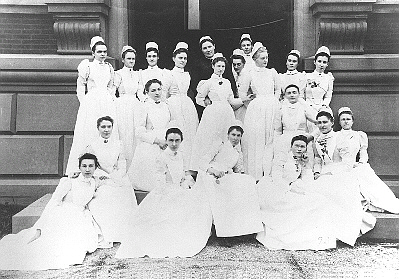The 1893 World’s Fair in Chicago introduced Americans to hamburgers, the Ferris wheel—and the idea of higher education for nurses.
Nurses hosted their first global meeting there, advocating for an educated workforce with professional standards of practice, rather than their traditional role as apprentices in hospitals.
This meeting attracted notable and progressive nursing leaders, including Lavinia Dock and Isabel Hampton, who had helped lay the foundation for the Johns Hopkins Hospital Training School for Nurses in 1889.
At the school’s opening, Hampton said, “As the university and hospital are looked to for what is best in science, so may it follow, that as time goes on and women go forth as graduates, this school may be looked to for what is best in nursing.”
In many ways, my role extends the vision of these early advocates to educate and support nurses around the world as expert clinicians and leaders.
The JHI nursing and quality team oversees clinical, consulting and knowledge-transfer activities that support our global health collaborations with leading organizations around the world. Nursing is an incredibly important component of each of our projects to help our international colleagues improve the capacity, quality and safety of health care.
Determining Factor
With each new global affiliation, we carefully assess the skills and training of its nursing staff. Our experience has taught us that nurses’ invaluable experience and dedication can be the difference between a patient’s life or death and a health system’s success or failure.
That’s why nursing education is virtually universal in our projects. We provide our affiliates’ nurses with clinical training, which covers routine, intensive and specialty care, as well as best practices in patient safety. We often bring affiliates’ nurses to Baltimore to observe alongside our nurses, not only in our main hospital, but also in our community hospitals and clinics. In some cases, these facilities bear a closer resemblance to those where our international colleagues operate.
We also provide less formal educational opportunities, including exchanges, one-on-one mentoring by our highly experienced nurses, teleconferences and online resources, leadership development and teambuilding to advance nursing practice in a way that is customized to the local region.
Proof Positive
In South Africa, for example, we are supporting pediatric nursing services at Nelson Mandela Children’s Hospital through a partnership between JHI; Jhpiego, a Johns Hopkins University affiliate; Johns Hopkins All Children’s Hospital; the Johns Hopkins Children’s Center; and the Institute for Johns Hopkins Nursing.
JHI is helping to develop the clinical bedside skills of pediatric care nurses at the hospital, supporting nurses’ development as managers and providing a mentorship exchange with the Children’s Center and All Children’s Hospital. Together, the Hopkins entities are striving to build the competency of the pediatric nursing staff at Nelson Mandela Children’s Hospital so it can provide specialized services that meet international care standards.
We have previously mentioned the first-of-its-kind Doctor of Nursing Practice Program that we developed and delivered with our partner Johns Hopkins Aramco Healthcare (JHAH) and the Johns Hopkins University School of Nursing.
Other JHAH nursing and clinical staff members can access 100 online distance-learning enrollments each year via the Institute for Johns Hopkins Nursing catalog. We are also providing them with access to relevant workshops using distance technology, such as online courses, podcasts, video conferences and webinars.
And when we bring various leaders, administrators and practitioners from all our overseas affiliates together once a year for our Partners Forum, nursing tracks always represent a major part of the sessions.
In fact, the chief nursing officers from a number of our Latin American hospital affiliates had such fruitful discussions at Partners Forum two years ago they decided to continue their conversation. Now, at quarterly videoconference sessions, nurse leaders focus on safety issues, including a universal quality measure: how to reduce and avoid falls.
What were once radical ideas—expanding educational opportunities and establishing professional standards of practice for nurses—are now pillars of academic medicine. JHI continues to promote these ideals and encourage what’s best in health care by providing clinical experiences and other training so nurses have the skills and insight needed to improve quality and capacity in health care locally and globally.
